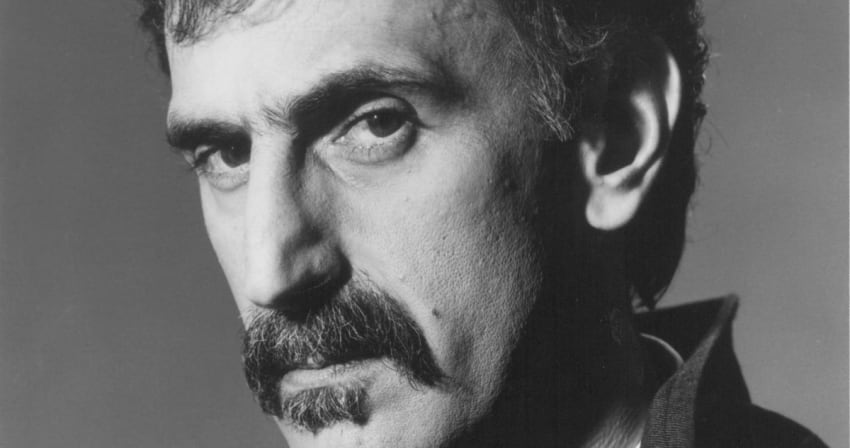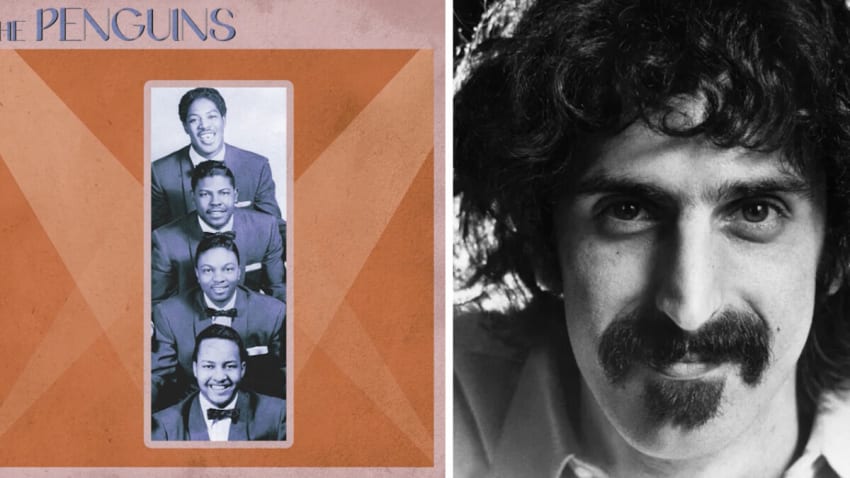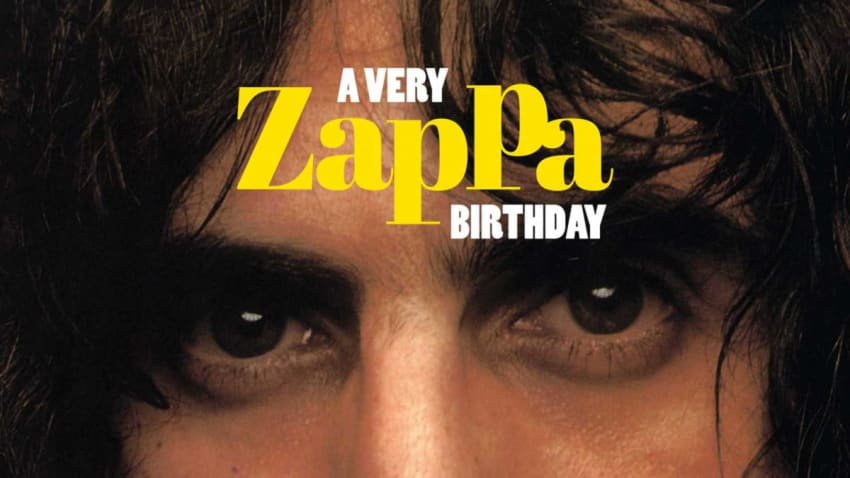‘Porn Wars’: Remembering Frank Zappa’s Anti-Censorship Campaign
Read a portion of the maestro’s testimony before a Senate committee hearing in 1985 and watch his famous 1986 appearance on CNN Crossfire.
By Nate Todd Dec 21, 2023 • 12:32 pm PST

Outspoken is an understatement when referring to Frank Zappa’s anti-censorship campaign in the mid-1980s. Zappa — who would have marked his 83rd birthday today — expressed his anti-censorship beliefs when he testified before the United States Senate Commerce, Technology and Transportation committee in 1985 and also through the music he released at the time.
In May 1985, a group referred to as the “Washington Wives” — co-founded by Tipper Gore, wife of then-senator Al Gore — founded the Parents Music Resource Center (PMRC) with the financial backing of the Beach Boys’ Mike Love and Joseph Coors of Coors beer, with the latter offering offices to the PMRC.
Advertisement
The PMRC, along with the National Conference of Parents and Teachers (PTA), lobbied both Congress and the record industry in an effort to put parental warning labels on records the groups deemed to be offensive and also print lyrics on albums they saw as “explicitly sexual, violent, vulgar or profane,” as per then-National PTA president Ann Kahn, published in an August 1985 Washington Post article. But the PMRC’s censorship goals went much deeper than that.
Read an excerpt from The Washington Post piece:
Though the content warning and printing of lyrics are the PMRC’s major issues at this point, it has also made a number of other requests: that records with explicit covers be wrapped or kept under the counter; that record companies reassess contracts with performers who engage in sexual or violent acts on stage; that broadcasters be pressured to exhibit “voluntary restraint” by not airing offending music videos, which would also be rated.
The PMRC compiled a list that gained the moniker the “Filthy Fifteen.” Here are some notable songs and why they were deemed offensive to the PMRC: Prince’s “Darling Nikki” (sex/masturbation), Judas Priest’s “Eat Me Alive” (sex/violence), AC/DC’s “Let Me Put My Love Into You” (sex), Twisted Sister’s “We’re Not Gonna Take It” (violence), Madonna’s “Dress You Up” (sex), Black Sabbath’s “Trashed” (drugs and alcohol), Def Leppard’s “High ‘n’ Dry (Saturday Night)” (drugs and alcohol), Mercyful Fate’s “Into The Coven” (occult) and Cyndi Lauper’s “She Bop” (sex/masturbation).
While Frank Zappa was not on the list, he had experienced his fair share of censorship. Zappa had problems getting distribution for his album Thing-Fish, which was later described in Kevin Courrier’s book Dangerous Kitchen: The Subversive World of Zappa as “a compendium of Zappa’s most explicit attacks on political and sexual hypocrisy in American culture collected together in one huge volley.”
After Zappa’s label Barking Pumpkin’s distributor MCA Records refused to distribute Thing-Fish, Zappa eventually struck a deal with EMI Records for Thing-Fish and the album Them or Us to be distributed by Capitol Records in the U.S. Both albums were released in 1984.
FZ included a “warning” in the sleeves of the records:
WARNING/GUARANTEE:
This album contains material which a truly free society would neither fear nor suppress. In some socially retarded areas, religious fanatics and ultra-conservative political organizations violate your First Amendment Rights by attempting to censor rock & roll albums. We feel that this is un-Constitutional and un-American.
As an alternative to these government-supported programs (designed to keep you docile and ignorant). Barking Pumpkin is pleased to provide stimulating digital audio entertainment for those of you who have outgrown the ordinary.
The language and concepts contained herein are GUARANTEED NOT TO CAUSE ETERNAL TORMENT IN THE PLACE WHERE THE GUY WITH THE HORNS AND POINTED STICK CONDUCTS HIS BUSINESS. This guarantee is as real as the threats of the video fundamentalists who use attacks on rock music in their attempt to transform America into a nation of check-mailing nincompoops (in the name of Jesus Christ).
If there is a hell, its fires wait for them, not us.
The “warning” was also included in Zappa’s 1985 album, the cleverly titled Frank Zappa Meets the Mothers of Prevention, referring to the PMRC, which he released in November 1985 just months after testifying before the United States Senate Commerce, Technology and Transportation committee on September 19, 1985.
In his testimony, Frank Zappa not only objected to censorship but also sniffed out “a rat” in that Tipper Gore’s husband Al Gore was co-sponsor of a piece of legislation Zappa called the “Blank Tape Tax.” FZ claimed that the formally titled H.R. 2911 was built to benefit a select few in the music industry and that the PMRC hearings were a distraction so that “Blank Tape Tax” could be passed, which he feared could lead to further censorship. Read an excerpt from Frank Zappa’s testimony below:
The PMRC proposal is an ill-conceived piece of nonsense which fails to deliver any real benefits to children, infringes the civil liberties of people who are not children, and promises to keep the courts busy for years, dealing with the interpretational and enforcemental problems inherent in the proposal’s design.
It is my understanding that, in law, First Amendment Issues are decided with a preference for the least restrictive alternative. In this context, the PMRC’s demands are the equivalent of treating dandruff by decapitation.
No one has forced Mrs. Baker or Mrs. Gore to bring Prince or Sheena Easton into their homes. Thanks to the Constitution, they are free to buy other forms of music for their children. Apparently, they insist on purchasing the works of contemporary recording artists in order to support a personal illusion of aerobic sophistication.
Ladies, please be advised: The $8.98 purchase price does not entitle you to a kiss on the foot from the composer or performer in exchange for a spin on the family Victrola. Taken as a whole, the complete list of PMRC demands reads like an instruction manual for some sinister kind of “toilet training program” to house-break all composers and performers because of the lyrics of a few. Ladies, how dare you?
The ladies’ shame must be shared by the bosses at the major labels who, through the RIAA, chose to bargain away the rights of composers, performers, and retailers in order to pass H.R. 2911, The Blank Tape Tax: A private tax levied by an industry on consumers for the benefit of a select group within that industry.
Is this a consumer issue? You bet it is. PMRC spokesperson, Kandy Stroud, announced to millions of fascinated viewers on last Friday’s ABC Nightline debate that Senator Gore, a man she described as “A friend of the music industry,” is co-sponsor of something she referred to as “anti-piracy legislation”. Is this the same tax bill with a nicer name?
The major record labels need to have H.R. 2911 whiz through a few committees before anybody smells a rat. One of them is chaired by Senator Thurmond. Is it a coincidence that Mrs. Thurmond is affiliated with the PMRC?
That’s some serious shady Washington wheeling and dealing. Real House of Cards level shit. But Zappa wasn’t done with his censorship campaign after testifying for the committee. He released the aforementioned Frank Zappa Meets the Mothers of Prevention in November 1985. The U.S. version of the LP contained the track “Porn Wars,” a Synclavier composition that contained audio from the PMRC hearings. Listen below:
Zappa also famously appeared on CNN’s Crossfire in 1986 where he had a heated exchange with Washington Times commentator John Lofton. See that below:




